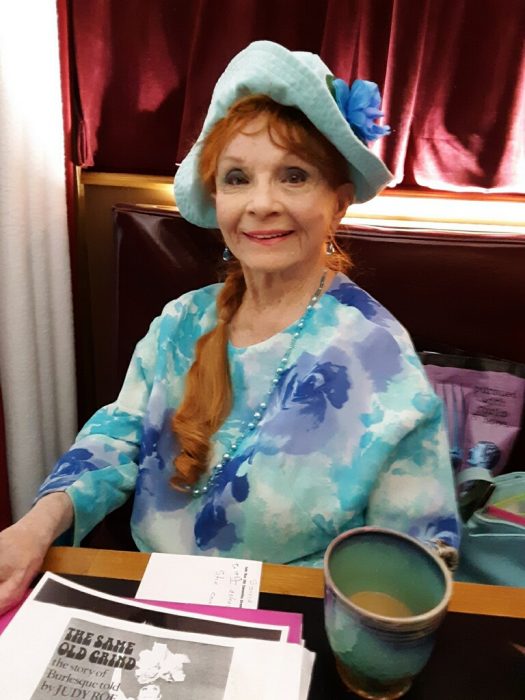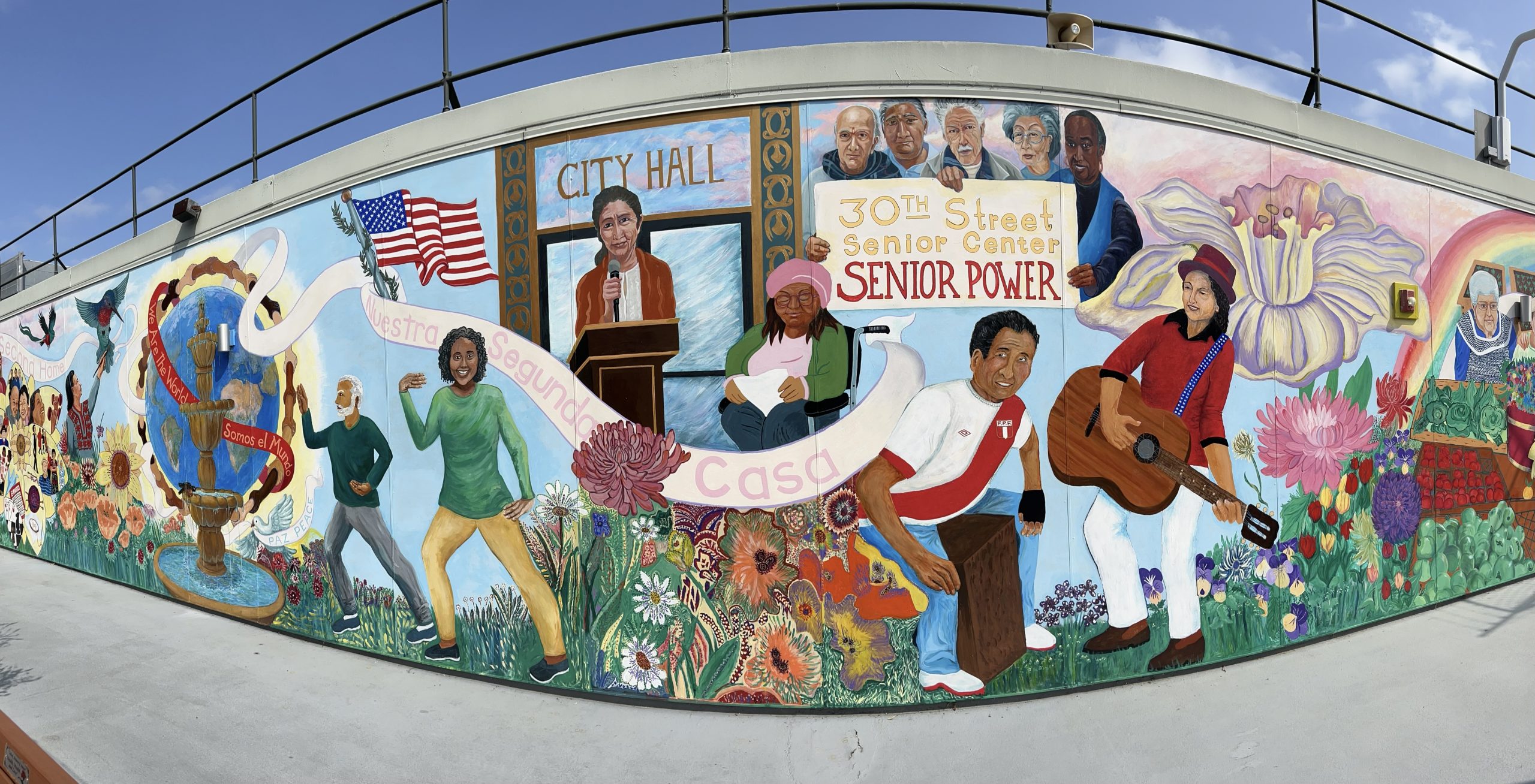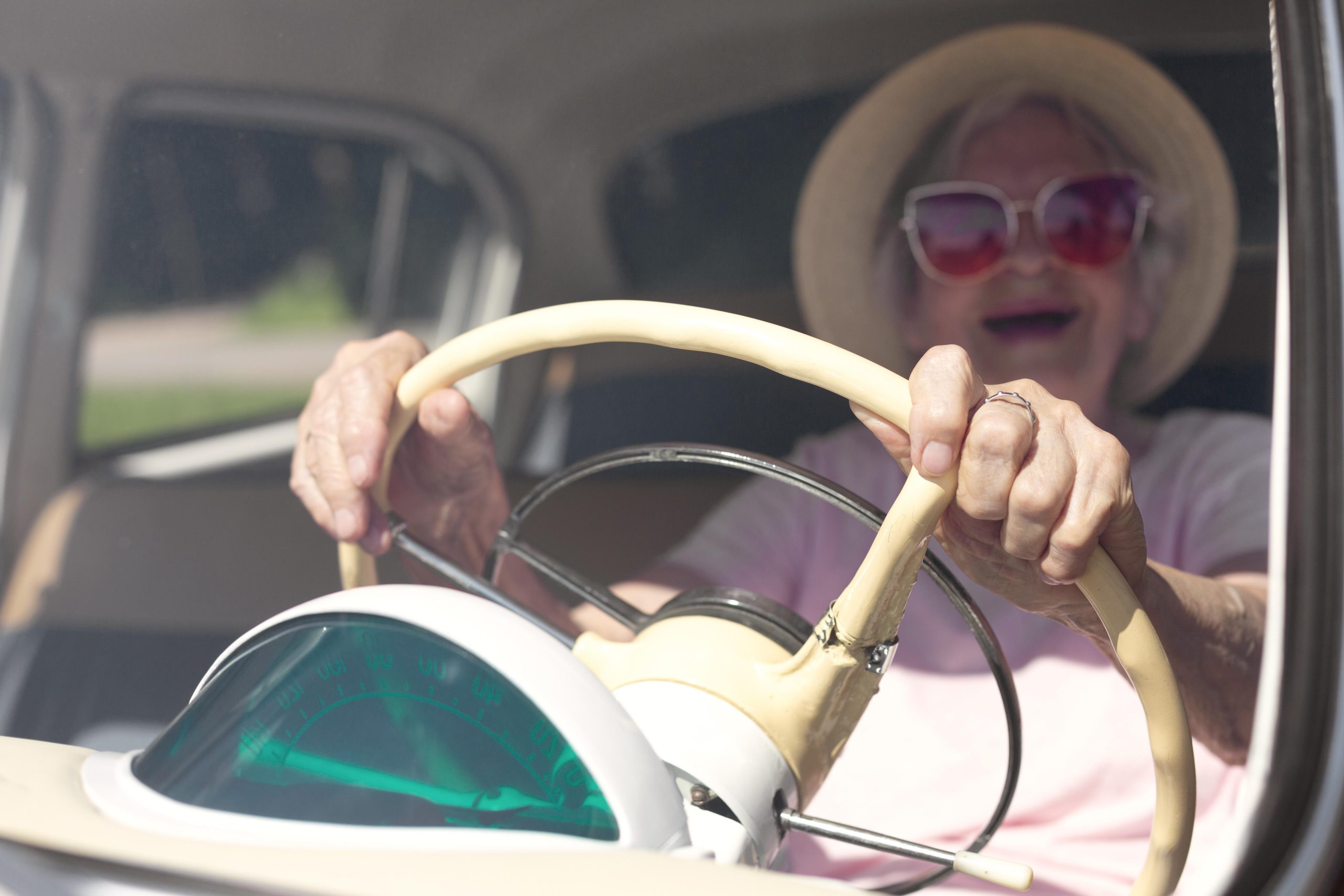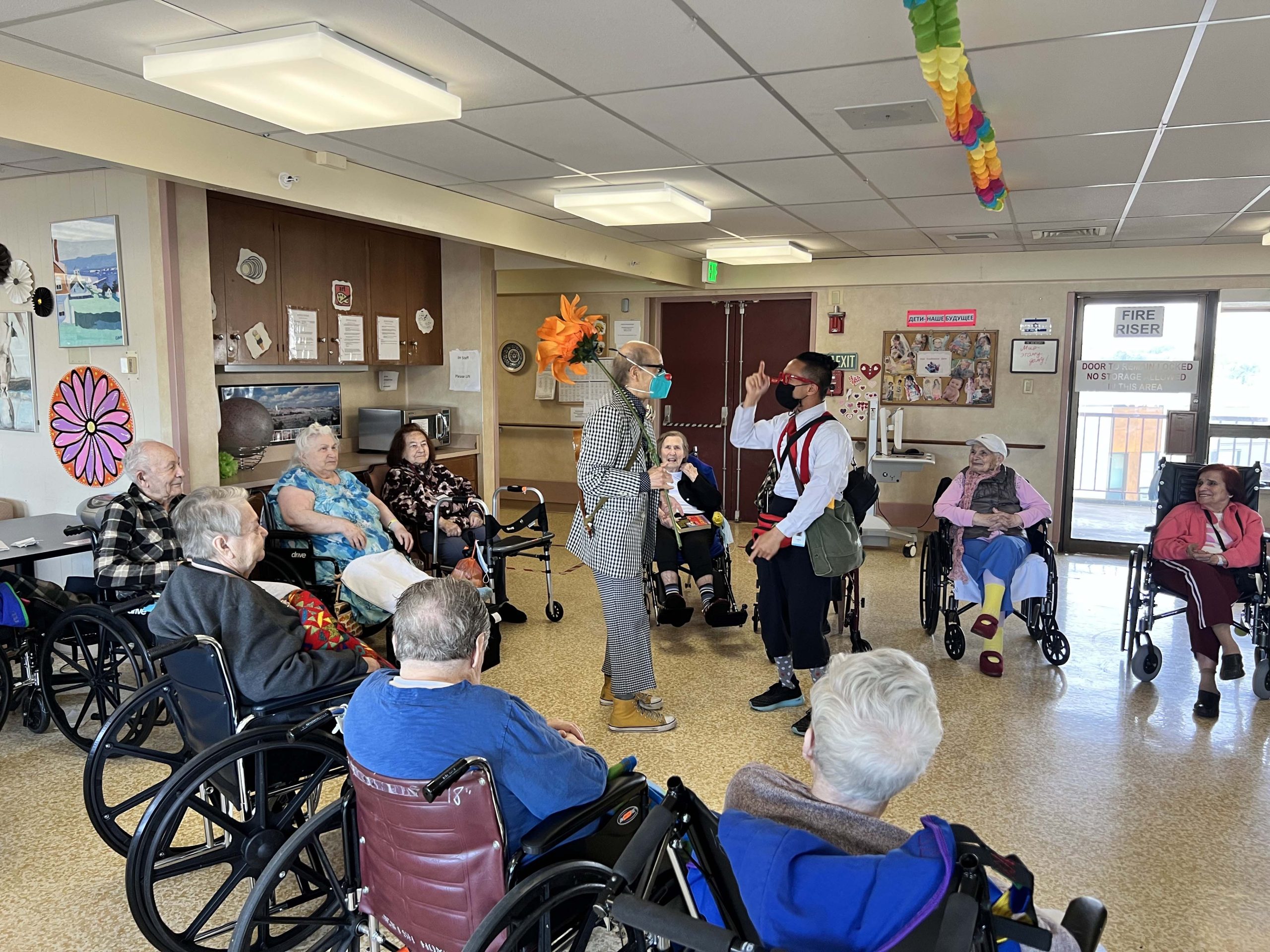Acting was her desire; burlesque jobs kept her employed, honed her theater skills and earned her respect in the industry
Judy Roe didn’t choose stripping; it chose her, she says. It was the fallback that filled the gaps in much of her working life.
Gigs in burlesque and nightclubs, along with other work, kept her fed and helped her hone a wide array of stagecraft skills that garnered respect and credibility in what was once a flourishing industry.
She got her first taste of theater in 1942 at age 17, touring with a troupe doing unauthorized Gilbert & Sullivan plays. She had learned enough from high school drama classes to land this acting, singing and dancing job.

But the troupe disbanded after bookings dried up. So, she began singing folk songs, posing for artists and performing in a variety of venues to earn a living. But by her 20s, her agent could no longer find her any bookings as a singer. He encouraged and she succumbed, she said, to accepting a two-week booking as a stripper at the Hollywood Burlesque Theatre in San Diego. It was a time when burlesque in the Mexican border town was booming.
Community theater, print shops and strip joints
“It wasn’t as scary as I thought,” Roe said. “I felt encouraged by the raucous enthusiasm of the audience, especially as my recent attempt at entertaining the Latino patrons of Mexicali night clubs with my all-American white-bread folk songs had been met with puzzled silence.”
For several years after, more “legit” jobs – acting and singing in touring companies and revues – came her way. She got roles in musicals, like My Fair Lady and Flower Drum Song at the Circle Star Theater in San Carlos. She sang in a Leonard Bernstein opera at the San Jose Civic Center. She appeared in two plays at The Old Globe Theatre in San Diego. She made costumes and props for the Hyatt Music Theatre – later the Hyatt Cinema – in Burlingame.
She also did some work in libraries and printing shops. But theater was her first love and all the while, she had been taking classes off and on at San Francisco State. She studied theater lighting, stage carpentry, prop building and costuming.
Theater classes, drink troubles and a child
But, by age 28, she recognized she had developed a serious drinking problem, she said, “and carelessly became pregnant.” She attended rehab and joined Alcoholics Anonymous. She also put her son up for adoption. “My plan was to earn a degree, any degree, to enhance my chances of obtaining steady employment outside of fickle show business. I was pregnant, penniless, living in a boarded-up back porch, behind in my rent, I was totally unready to care for an infant or to raise a child.”
But the adoption of her son fell through; he had a birth defect. With donations of baby clothes, formula and initial corrective surgery paid for by the Catholic Church’s Crippled Children’s Agency, she took him to her back-porch home. Eventually, with financial help from her estranged mother, she paid for his round-the-clock care in the home of a middle-aged couple licensed to care for infants. And within 11 months, they offered to adopt him, knowing he would need future surgeries, Roe said. She agreed.
Roe was well past her 30s when she was back looking for work. Her first job was at The President Follies Burlesque on McAllister Street in San Francisco. She was hired as a chorus girl and “talking woman” – an actual job title – who banters with a comic in short sketches between other acts. One example: A man carrying a violin case is looking around with a worried air. Spying Roe, he says, ‘Pardon me madam. Can you tell me how to get to Carnegie Hall?’ Her loud response: ‘Practice! Practice! Practice!’ “
Decadence, glamour and skills training
Soon enough, she was assigned her own strip-tease spot. Return engagements there and at other burlesque venues and Bay Area night clubs kept her employed. Those jobs were always available. She worked in Fort Worth, Dallas, San Diego, San Francisco and New York.
Burlesque venues at the time ranged from seedy to classy. One of the latter, where Roe worked, was the Diamond Horseshoe Nightclub, opened in 1938 by famed Broadway producer and “Me and My Shadow” lyricist Billy Rose. Customers were lured by its atmosphere of decadence and glamour, with Gay Nineties, circus-themed or other fantastical sets for revues.
In addition to performing, Roe got the opportunity throughout many of these various gigs to do stage lighting, set construction, choreography and even produce shows. “My first instinct was to become a performer, but I quickly realized I could do technical work as well,” Roe said. “In this business at this time, no one just did one thing and I was no exception.”
By all rights, she was successful. She had experience – and savvy. One of her roles in strip clubs was chatting with customers so they’d stick around and spend more money. “I was a skillful B-girl and could always find work in any dive, where my decorating the bar with my come-on presence, and my encouraging patrons to buy drinks, were more important to the management than any artistry I might display as a stripper.” She also made sure the bartenders mixed her non-alcoholic drinks.
A theater degree waiting in the wings
But by the age of 47, she felt it was time to do something different. She inquired at San Francisco State to see how many units she’d need to complete a theater degree. She was amazed to find she already had enough – in fact more than enough. “Sixteen years after boozily staggering away from State College, I applied for my diploma and received it by mail.”
That was 1973, but by this time, the degree was hardly needed and “never of the slightest use,” she said, adding that every job she ever had “I obtained on the strength of my known show business experience and my reputation among colleagues – not my academic achievement.”
In the 1980s, she was producing burlesque shows at the Sutter Street Theater. She was hired by San Francisco’s famous Condor Club, where stripper Carol Doda reigned, to refurbish its faded and battered performing area. And the infamous O’Farrell Theatre brought her in to produce a show hoped to avert local discontent over the club’s growing notoriety.
A Mitchell Brothers’ production
Familiar or not with the entertainment scene of the 1970s and ’80s, most longtime San Franciscans have heard of the politics surrounding the theater and its owners, the Mitchell Brothers. Roe approached them with the idea of producing a show that would have wide, middle-class appeal and alleviate their troubles with then-Supervisor Dianne Feinstein.
She recruited performers, hired and managed the company, all while doing costuming, choreography and staging. She said the show was successful and she was well paid. She quit when the owners started asking that performers to use sex toys onstage, she said.
Roe was born in San Francisco and was an only child to a single mother; her parents divorced and her father left before she was born. She didn’t like school, ran away a lot and dropped out in her senior year. She said she was labeled an “incorrigible wayward.”
Asked what else was going on after the traveling troupe and in between subsequent jobs, she demurely smiled, “I started getting married.” She has five ex-husbands and can name them in their proper order: Willie, Mark, Peter, Herman and Gus.
A behind-the-scenes novel
And over the course of some 60 or more years of working, Roe also did some writing. She had earned some money with short pieces in local publications but longed to write a character-driven novel in a familiar milieu. The result was “The Same Old Grind,” issued in 1975. It garnered half-page interviews in the Style sections of the San Francisco Chronicle and the Oakland Tribune.

She had a publisher, but the book didn’t sell well. So, Roe began contracting directly with booksellers, arranging talks and signings and travelling her own lecture circuit. She also spoke on “The History and Tradition of Burlesque” at rotary clubs, veterans’ clubs, colleges, libraries, the Presidio Officers’ Club and other venues.
She currently helps other would-be writers and does manuscript editing for a fee.
She admits being a bit embarrassed, in retrospect, about some of the ill-written parts of her book. Still, she said, “In my idle dreams, a New York publisher discovers my novel and invites me to rewrite it. I’d love to do that.”
She has since had short stories published in pulp mystery magazines but concedes her vague urge to write again would have to accelerate. “A novel is hard, hard work.”
Reuniting with her son
So, as her 95th birthday approaches, she’s content visiting with her 17 “lively” cousins of all ages, browsing the city museums and gardening in her 4’x4’ plot of culinary herbs, tomatoes, saffron and bright annual flowers.
And she has been back in touch with her son. Fifty-seven years after he was adopted, she said, she happened to see in an online advertisement for household supplies the name of a salesman at a Bay Area Home Depot. “It was the same as my son’s adoptive parents’ name, and the salesman’s first name was the name I had given my son.”
She got in touch. He made and repaired string instruments, she said, but looked to his sales job for steady income. He knows of her strip-tease work; she said he sees it, as she does, as one of many ways she made a living over the years when she was unable to derive a steady income as a dramatic actress.
“My son will be 67 in July of this year. He still works for The Home Depot. I will be 95 in August. We two senior citizens see each other often.”





